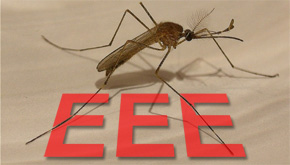Second Case Of Eastern Equine Encephalitis Confirmed In Area
August 15, 2014
A positive case of Eastern Equine Encephalitis (EEE) has been detected in Escambia County, Ala., — the first in Alabama and the second in the North Escambia area.
 That announcement comes just after the Escambia County (Fla.) Department of Health confirmed that an unimmunized horse in Escambia County, Fla., was recently euthanized because it contracted the mosquito-borne EEE.
That announcement comes just after the Escambia County (Fla.) Department of Health confirmed that an unimmunized horse in Escambia County, Fla., was recently euthanized because it contracted the mosquito-borne EEE.
According to the Escambia County (Fla.) Department of Health, unimmunized horses are at risk for this disease. Horse owners are encouraged to keep current all equine immunizations for mosquito-borne diseases.
To protect horses from the effects of this disease, vaccinations should be current and delivered on a frequency of two times each year, every six months in consultation with a local veterinary professional.
EEE is a mosquito-transmitted disease that is much more severe than West Nile Virus (WNV). The mortality rate in horses from WNV is reported at around 30%, while the rate for EEE is almost 90%. Infected mosquitoes are the primary source for EEE. The virus causes inflammation or swelling of the brain and spinal cord. General symptoms include central nervous system signs such as: head pressing, convulsions, lack of response to facial stimulation, fever above 103 degrees, ataxia, paralysis, anorexia, depression and stupor. Other symptoms may include irregular gait, teeth grinding, in-coordination, circling, and staggering. All symptoms may not be exhibited by an infected horse.
“This is the time of year that we are extremely vulnerable to the spread of mosquito-borne viruses and we need to protect our livestock and ourselves” stated Alabama Agriculture & Industries Commissioner John McMillan. “I want to encourage horse owners to vaccinate their horses for both EEE and West Nile Virus as soon as possible.”
While EEE rarely infects humans, transmission of the virus to humans is possible from the bite of an infected mosquito. Human signs and symptoms of EEE infection can include sudden onset of headache, high fever, chills, and vomiting. The illness may then progress into disorientation, seizures, and coma. Severe cases of EEE infection in humans can lead to brain damage or death. Persons experiencing symptoms of a mosquito-borne disease should seek immediate medical care.



Comments